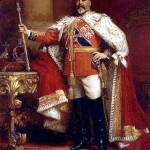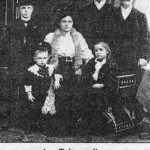Edwardian Britain
Category: 20th century When Queen Victoria died in January 1901 a whole age passed. Enormous changes had taken place like the urbanization of Britain and a rise of population from about 25 million to something like 41 million, but a monarchy which had been discredited was now felt to be not only a symbol but part and parcel of the life of the people and of the Empire, even if, save in rare cases, it had become politically powerless.
When Queen Victoria died in January 1901 a whole age passed. Enormous changes had taken place like the urbanization of Britain and a rise of population from about 25 million to something like 41 million, but a monarchy which had been discredited was now felt to be not only a symbol but part and parcel of the life of the people and of the Empire, even if, save in rare cases, it had become politically powerless.
Edward VII, the son of Queen Victoria and Prince Albert of Saxe-Coburg-Gotha, was 59 when he ascended the throne in 1901. King Edward VII. The new king was very different from his royal mother. He was the real merry monarch who liked parties, gambling, and going to races. Over-disciplined in his youth, Edward VII sought compensation in merrymaking and luxury.
 Edwardian Britain was a powerful and rich country, much of its wealth coming from business abroad. British money had been invested in many countries, and British banks and insurance companies had customers and did business all over the world. Edward VII inherited not only a great empire, but also the Boer War in South Africa.
Edwardian Britain was a powerful and rich country, much of its wealth coming from business abroad. British money had been invested in many countries, and British banks and insurance companies had customers and did business all over the world. Edward VII inherited not only a great empire, but also the Boer War in South Africa.
The world at large had little sympathy with Great Britain during this conflict and, amongst its many critics, none spoke louder than Wilhelm II of Germany, a monarch heartily disliked by his uncle Edward VII. Imperial Germany was becoming exceedingly powerful. A matchless army was now supported by a growing fleet, rendered the more formidable by the opening of the Kiel Canal in 1895. The kaiser suffered from every sort of ambition — military, naval, colonial — and his great people, over-conscious of their distinguished gifts and proud of their steel production, brooded enviously on the misfortune of having started late in the race for power.
Germany was strengthened by the Triple Alliance, into which she had entered with Austria and Italy, against which stood a Dual Alliance of Russia and France. England’s “splendid isolation” was now clearly anachronistic, and the country stepped out of it into the Anglo-Japanese Alliance of 1902. With Germany jealous and contemptuous, the next move made by Britain was towards France. Agreement was reached over British interests in Egypt and those of the French in Morocco, and the informal but invaluable “Entente Cordiale” of 1904 came into being.
Then, in 1907, Britain turned to Russia, no longer so menacing after her rough handling by Japan in the war of 1904-1905, and the Triple Entente (Great Britain, Russia, France) was achieved. But Austria, backed by Germany, was powerful enough to seize Bosnia and Herzegovina in 1908, the Tzar’s protests proving vain. Thus the Triple Entente faced the Triple Alliance of Germany, Austria and Italy.
While the powers were thus regrouping and moving towards the disaster of 1914, life was not uneventful at home. As the reign of King Edward VII began most of the British were deeply concerned with domestic matters. In Edwardian Britain, there were important changes in the way that people lived and were governed. In 1900 the Labour Representation Committee, which soon became the Labour Party, was formed. Its aim was to see working people represented in Parliament. The Committee was supported by powerful trade unions.
Arthur Balfour’s Education Act in 1902 helped to meet the demand for national efficiency with the beginnings of a national system of secondary education. The government began providing secondary education, but only a small number of children could go to secondary school. They either had to pay, or be clever enough to pass a scholarship exam.
The general election of 1906 gave the Liberal Party an overwhelming majority. The Liberal government, headed first by Henry Campbell-Bannerman, and then by Herbert Asquith laid the foundations of the welfare state. Its programme included old-age pensions, government employment offices, such as Employment Exchanges, unemployment insurance, a contributory programme of national medical insurance for most workers, and board to fix minimum wages for miners and others. Women still did not have the vote.
Although the economy seemed to be booming, wages scarcely kept up with rising prices, and the years 1911 to 1914 were marked with strikes by miners, dock workers, and transport workers. Suffragists staged violent demonstrations in favour of the enfranchisement of women. When the Liberal government sought to enact Home Rule for Ireland, non-Catholic Irish from Ulster threatened force to prevent Britain from compelling them to become part of a semi-independent Ireland. In the midst of these domestic disputes, a crisis in the Balkans exploded into World War I.
